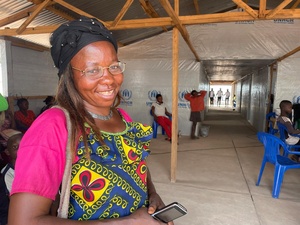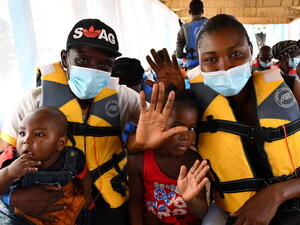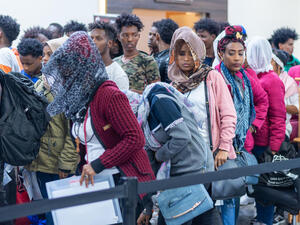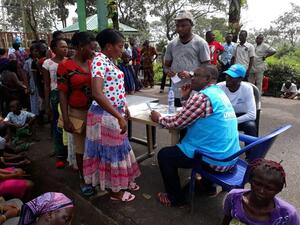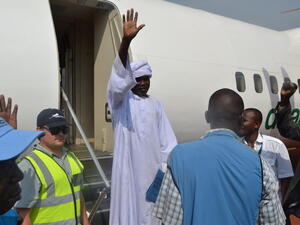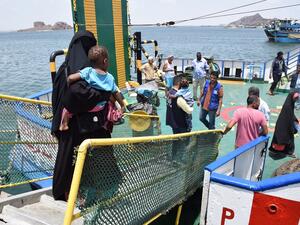Pakistan camp bids farewell to large convoy of Afghans
Pakistan camp bids farewell to large convoy of Afghans
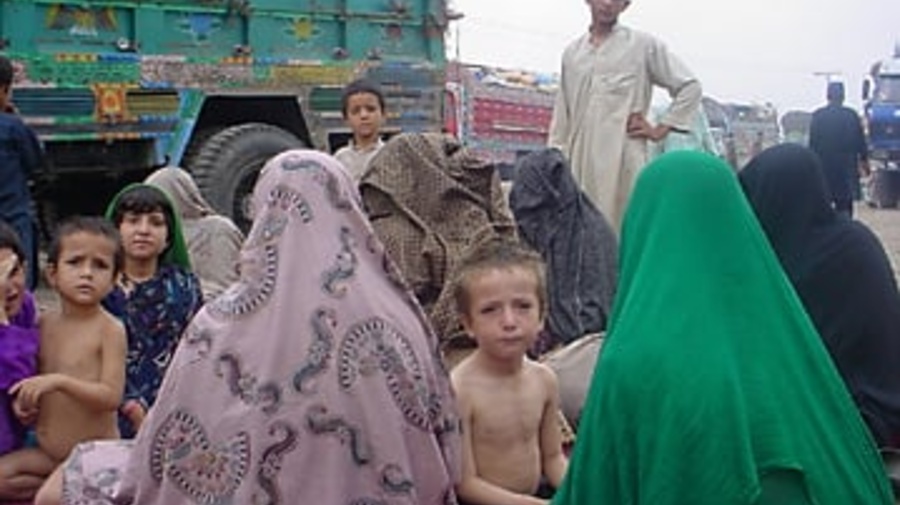
This family joined 239 others from Khaki camp at Hayatabad Iris Validation Centre before heading home to Afghanistan.
PESHAWAR, Pakistan, August 4 (UNHCR) - More than 1,000 Afghans went home this week from a refugee camp in Pakistan's North-West Frontier Province (NWFP) in one of the year's biggest organised return convoys.
The 240 Afghan families left Khaki camp in Mansehra - about five hours' drive from the NWFP capital, Peshawar - on Wednesday and were processed at UNHCR's Hayatabad Iris Validation Centre on Thursday. With 1,033 Afghans in the group, the convoy was bigger than the current daily average of 100-300 individuals passing through the Hayatabad centre.
Omra Khan, a 60-year-old Pashtun man, was among the returnees from Khaki camp. "I came here because of the Russian invasion of our land and we could not live under those circumstances," he explained. "I have lived in Pakistan for more than 25 years and now it is time to go back."
Established in the early 1980s, Khaki camp is home to Afghans from Paktia, Logar, Nangarhar and Laghman provinces, and smaller numbers from Baghlan. Thursday's returnees were heading to Kelagai village in Doshi district of Baghlan province.
"The elders of Kelagai village living in Khaki camp decided to repatriate because we came to know that some people have occupied our land," said Omra Khan. "Once we go there, we will ask the government to help us get it back."
The shortage of land and shelter in Afghanistan is among the biggest obstacles to repatriation, according to the findings of a government census of Afghans in Pakistan conducted in February last year. Some 57 percent of the 3 million Afghans counted in the census said they could not return because they had no shelter in Afghanistan. Another 18 percent were concerned about the absence of livelihood opportunities back home.
Omra Khan was a daily wage earner in Pakistan, and in Afghanistan before his exile. He will probably work as a daily labourer when he returns home.
Muhammad Mir was also travelling in Thursday's convoy. "After leaving Afghanistan, I started living in Khaki camp but it was very hard to meet the expenses, therefore I decided to go to Saudi Arabia. I worked there for 24 years but now I only want to return to my country and spend the rest of my life there," he said. "I want my children to see their own country. They cannot be refugees all their life," he added, before repatriating with his family and frail old mother.
More than 113,000 Afghans have returned home from Pakistan so far this year. Under the assisted return programme, UNHCR offers returning Afghans travel assistance that varies from US$4 to US$37 per person depending on the distance, and a cash payment of $12 per person to help them re-establish themselves in Afghanistan. The assistance is paid on arrival in Afghanistan.
All those over the age of six who are repatriating with UNHCR assistance must go through an iris recognition test in Pakistan, which ensures that no one receives the return package more than once.
Since UNHCR started facilitating returns to Afghanistan in 2002, more than 2.85 million Afghans have returned from Pakistan and more than 1.4 million from Iran. An estimated 2.5 million Afghans remain in Pakistan and over 900,000 in Iran.
By Rabia Ali in Peshawar, Pakistan


